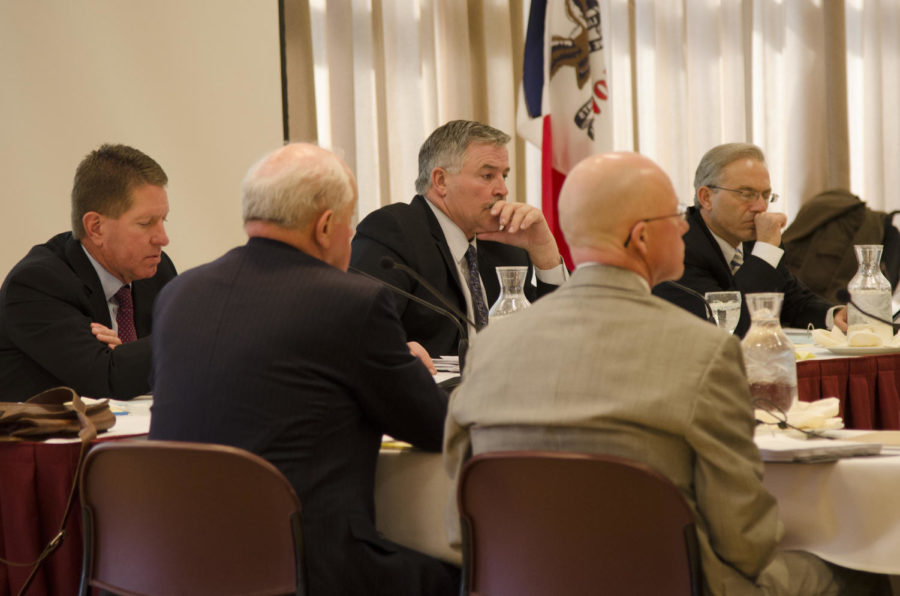Board of Regents Nominees cause controversy
(From left to right) Board of Regents President Pro Tem Bruce L. Rastetter, President Craig A. Lang and Executive Director Robert Donley lead the Board of Regents meeting in the Sun Room of the Memorial Union. Issues regarding Iowa students and universities were discussed in the March 13, 2013, meeting.
March 28, 2013
The Iowa Senate faces a tough decision regarding a future vote between three nominees for the Board of Regents.
The three nominees, Craig Lang, Robert Cramer and Dr. Subhash Sahai, will require two-thirds approval from the Senate in order to serve a six-year term on the Board of Regents.
The nominations of Lang and Cramer, both republicans appointed by Gov. Terry Branstad, have caused some hesitation of approval.
Neither candidate received a recommendation from the chamber’s Education Committee in a hearing on March 18.
Democratic Senator Herman Quirmbach said, “My biggest concern regarding to Mr. Lang’s record is the Harkin Institute mess and the loss of Tom Harkin’s papers. I know it’s not just one person who is at fault there, but Mr. Lang has been president of the Board of Regents.”
The second republican contender, Cramer, has faced a large amount of scrutiny regarding his stance on the Lesbian Gay Bi-sexual Transgender program.
Cramer has been publicly linked with the Family Leader, an influential conservative group that has proven to be adamantly opposed to gay marriage.
The group even anti-endorsed 2011 republican presidential candidates because they did not support Constitutional amendments banning gay marriage.
“[His involvement] is not a disqualification. There are certain core values of a major university. One of those core values is equal opportunity,” Quirmbach said. “If the leaders of that university, and the people overseeing it, don’t have those values, then I don’t see how they can lead.”
Quirmbach challenged Cramer to his beliefs in a conversation on March 26, 2013, comparing homosexuality as a decision to the choice of religion.
“He said that we have to defend religion; we can’t persecute because of religion,” said Quirmbach of Cramer’s comments. “There’s an inconsistency there that implies a deep misunderstanding. We need leaders who are committed to equal opportunity for LGBT and provide a supportive environment.”
Quirmbach said that he would not vote for Cramer and that he knows a number of his colleagues have deep concerns about the nomination of Cramer.
The third candidate, Sahai, has received recommendation from the Education Committee.
“The governor made it very clear that he always had a physician on the Board of Regents,” Sahai said. “There hasn’t been a physician for the past couple of years, so that’s one reason I think I was fortunate enough to be selected for the position.”
Quirmbach speaks highly of Sahai.
“I think he’s a serious, intelligent guy and I think he’ll be very good on the Board of Regents. I’m glad the governor appointed him,” Quirmbach said.
When asked how he feels about Cramer’s public opposition to the LGBT area, Sahai said he had no issues with Cramer.
Students of the regent universities, on the other hand, have openly expressed their disapproval of Cramer.
In the letter signed by seven student body leaders, concerns for equal opportunity on university campuses were voiced.
A few main points of the letter stated, “Mr. Cramer has adamantly opposed the advancement for rights for the lesbian, gay, bisexual, transgender (LGBT) community … as student leaders, it is our priority to ensure all students feel welcome when bringing issues to the Board’s attention. … We urge the Iowa Senate to deny the proposed appointment of Robert Cramer to the Board of Regents.”
The final sentence was in bold.
Iowa State GSB President Jared Knight said in a comment to the Des Moines Register, “It’s not clear that he’s committed to equal opportunity for everyone,” Knight said. “[The Regents board] is really not the place for a social policy advocate, regardless of which side of the issue they’re on.”
The Senate has until April 15 to make a confirmed decision on the nominees.







